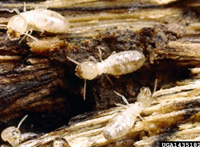
While it is well-known that roads can spread invasive weeds, new research shows that some roads are worse than others. In Utah, areas along paved roads were far more likely to be invaded than those along 4-wheel-drive tracks. This suggests that limiting road improvements would help keep out invasive weeds.
“Each step of road improvement would appear to convert an increasing area of natural habitat to roadside habitat,” say Jonathan Gelbard, who did this work while at Duke University in Durh

Biologists believe that climate change is affecting living things worldwide, and the latest evidence suggests that warmer winters may mean fewer migratory birds. New research shows that as winter temperatures have risen in central Europe, the number of migratory birds has dropped. Ultimately, this may also decrease the number of migratory bird species there.
“We predict that with increasing winter temperatures…the number of long-distance migratory bird species should decline,” say Nicole L

Known for its intoxicating effects on felines, catnip oil may also have a future in termite control. Recent experiments by USDA Forest Service researcher Chris Peterson show that catnip oil repels and even kills termites in a laboratory setting.
Peterson, a researcher with the Forest Service Southern Research Station (SRS), and fellow researcher Janice Ems-Wilson, a chemist at Valencia Community College in Orlando, FL, presented the results of their research at the national meeting of the Am

Intricate patterns formed by granular materials under the influence of electrostatic fields have scientists at the U.S. Department of Energy’s Argonne National Laboratory dreaming of new ways to create smaller structures for nanotechnologies. With a combination of electric fields and fluid mixtures, researchers Igor Aronson, Maksim Sapozhnikov, Yuri Tolmachev and Wai Kwok can cause tiny spheres of bronze and other metals to self-assemble into crystalline patterns, honeycombs, pulsating rings and

A bacterium’s ability to change its hairstyle may help in the effort to clean contaminated groundwater for drinking, according to Penn State researchers.
People are continually moving into places that are hot, sunny and arid where drinking water is in short supply, says R. Kramer Campen, Penn State graduate student in geosciences. “The imperative to find ways to clean groundwater is paramount,” he told attendees today (March 25) at the 225th American Chemical Society national meeting i

Supermassive black holes, notorious for ripping apart and swallowing stars, might also help seed interstellar space with the elements necessary for life, such as hydrogen, carbon, oxygen and iron, scientists say.
Using NASA’s Chandra X-ray Observatory and ESA’s XMM-Newton satellite, scientists at Penn State University and the Massachusetts Institute of Technology found evidence of high-speed winds blowing away copious amounts of gas from the cores of two quasar galaxies, which are

– new calculation confirms standard model of particle physics. Contribution of hadronic vacuum polarization determined with unprecedented accuracy. The magnetic moment of the muon is an important precision parameter for…
Technique may prevent formation of unwanted waves that siphon off needed energy. Heating plasma to the ultra-high temperatures needed for fusion reactions requires more than turning the dial on a…

An international team of astronomers, led by researchers from the Astronomical Observatory of the University of Warsaw, have identified a new class of cosmic X-ray sources. The findings have been…

How deubiquitinases USP53 and USP54 cleave long polyubiquitin chains and how the former is linked to liver disease in children. Deubiquitinases (DUBs) are enzymes used by cells to trim protein…

Conceptual blueprint to analyze experimental catalyst data. Machine learning (ML) models have recently become popular in the field of heterogeneous catalyst design. The inherent complexity of the interactions between catalyst…

Antibody that Neutralizes Inhibitory Factors Involved in Nerve Regeneration Leads to Enhanced Motor Function after Acute Spinal Cord Injury. Researchers at 13 clinics in Germany, Switzerland, the Czech Republic and…

How simulations help manufacturing of modern displays. Modern materials must be recyclable and sustainable. Consumer electronics is no exception, with organic light-emitting diodes (OLEDs) taking over modern televisions and portable…

“Neurons that fire together, wire together” describes the neural plasticity seen in human brains, but neurons grown in a dish don’t seem to follow these rules. Neurons that are cultured…

The quest for sustainable energy solutions has been a major focus of scientific research for decades. Solar energy, a clean and renewable source, has emerged as a promising alternative to…

With a processing speed a billion times faster than nature, chip-based laser neuron could help advance AI tasks such as pattern recognition and sequence prediction. Researchers have developed a laser-based…

New technology could remotely identify various types of plastics, offering a valuable tool for future monitoring and analysis of oceanic plastic pollution. Researchers have developed a new hyperspectral Raman imaging…

Artificial Intelligence (AI) has established a strong presence across industries, large and small. The “VoBaKI” research project has empowered small and medium-sized enterprises (SMEs) with an innovative tool to independently…